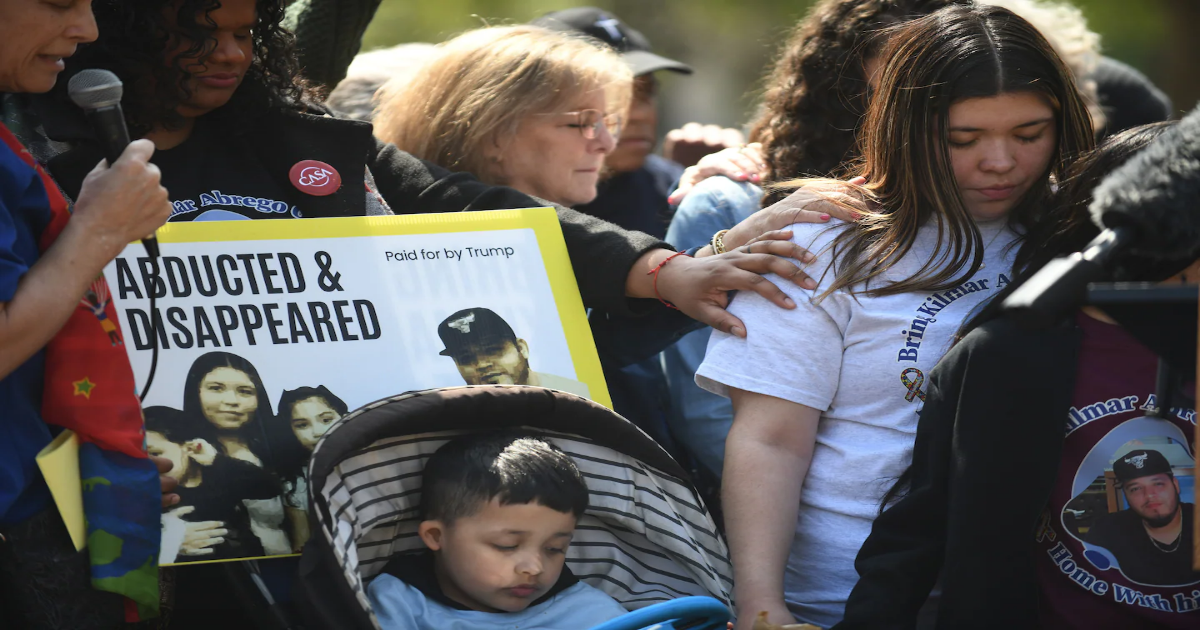President Donald Trump is thumbing his nose at the spirit of last week’s Supreme Court ruling that his administration must “facilitate” the return of Maryland father Kilmar Abrego García after he was mistakenly deported to a maximum-security prison in El Salvador.
Sitting next to a defiant Trump in the Oval Office on Monday, Salvadoran President Nayib Bukele said he will not return Abrego García, who fled El Salvador in 2011 to escape gang violence. “Of course I’m not going to do it,” he said, referring to Abrego García as a “terrorist.” In Sunday court filings, the Justice Department dubiously asserted that the Supreme Court’s ruling was so narrow, the U.S. government has no obligation to seek Abrego García’s repatriation — only to allow him in if he returns.
The Trump team frames this as a fight over a president’s constitutional authority. “No court in the United States has a right to conduct the foreign policy of the United States,” said Secretary of State Marco Rubio. But this is not what the court is trying to do. The principle in play here is the rule of law.
In October 2019, a U.S. immigration judge denied Abrego García’s asylum request but granted him protection from being deported back to El Salvador. He was released after Immigration and Customs Enforcement did not appeal. His lawyers say he came to the United States as a teenager after the Barrio 18 gang tried to extort his mother, who owned a pupusa shop, for protection money and then tried to recruit him.
The Department of Homeland Security claimed in Sunday’s court filing that he is “no longer eligible” for protections afforded by the judge’s 2019 order because he is a member of MS-13, and Trump has now designated this gang a foreign terrorist organization. Six years ago, however, the government had already unsuccessfully argued in court that Abrego García was an active member of a New York-based MS-13 group. The main evidence offered to support this charge, in addition to statements by a confidential informant, was that he was wearing Chicago Bulls gear, which the group fancied, when police picked him up outside a Home Depot in Maryland, where he was trying to get construction work. But Abrego García never lived in New York, so the claim made no sense. And he firmly denies it.
Nor can the government simply declare a judge’s six-year-old order null and void without some form of due process. Before he was sent to El Salvador on March 15, Abrego García was given no opportunity to argue against his removal from the country. And the government was not required to present any evidence that he is part of MS-13.
This is a sheet-metal apprentice whose wife and children are U.S. citizens.
An initial Justice Department filing called his removal an “administrative error.” The department has since suspended a veteran staff lawyer for acknowledging in court that Abrego García was mistakenly deported. Speaking Monday on Fox News, however, Stephen Miller, a deputy White House chief of staff, claimed that Abrego García’s removal was not actually a mistake. If Miller is telling the truth — claiming something the government has not said in court — then the Trump team willfully defied the judge’s 2019 order not to send him to El Salvador. Miller says that, if he winds up coming back to the United States, ICE will detain him. But if the administration is so confident that it can secure a removal order via standard deportation proceedings, why not do so?
This is not yet a constitutional crisis, because the administration continues to insist that it is complying with court orders. U.S. District Judge Paula Xinis is likely to rule against the administration on this claim, for which it will then seek relief from the U.S. Court of Appeals for the 4th Circuit. A quibble over what it means to “facilitate” someone’s return could well end up back at the Supreme Court. Justices across the ideological spectrum, even those with a maximalist view of presidential power, should defend the core American principle that judicial branch rulings must be respected — whether their own from last week or the immigration judge’s ruling in 2019.
Abrego García’s rights are being violated. His lawyers fear for his safety at a notorious mega-prison where dozens of inmates share a single cell. They worry he could be tortured or killed, either by El Salvador’s government or leaders of the gang he left that country to escape. If anything happens while this legal fight drags on, the Trump administration will have blood on its hands. Abrego García should be returned to his family in Maryland as soon as possible.
